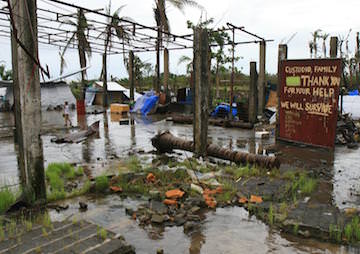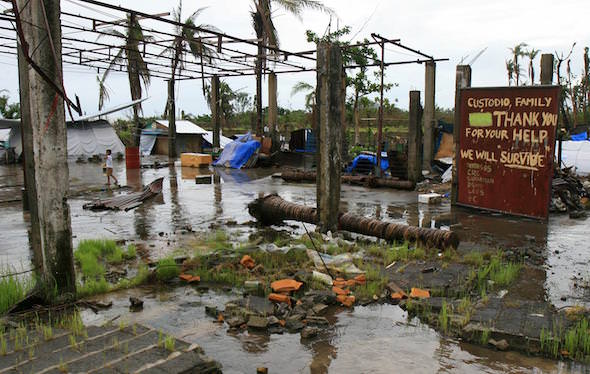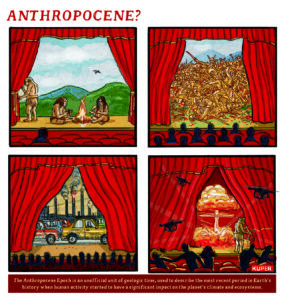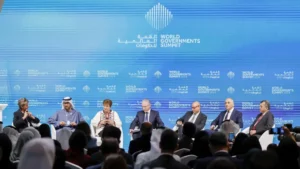Climate Cash Flow to Poorer Nations Is Still Too Slow
Rich countries are failing to fulfill pledges to make billions of dollars available to help the developing world face climate change.
By Kieran Cooke, Climate News Network

Survivors of Typhoon Haiyan, which hit the Philippines in 2013, put up a “thank you” sign for aid support. (Oxfam International via Flickr)
This Creative Commons-licensed piece first appeared at Climate News Network.
LONDON — World leaders are not delivering fully on agreements made at successive climate negotiations to channel US$100 billion annually from rich countries to poor in order to tackle and adapt to climate change.
An analysis of cash flows by the Organisation for Economic Co-operation and Development (OECD) — which links the world’s wealthier countries — finds the target due to be reached by 2020 is still far from being met.
The OECD says that, at present, the rich countries are channelling on average about $57bn each year to help poorer nations limit carbon emissions and deal with extreme weather events and rising sea levels.
Complex business
It has spent several months trying to gauge climate-related cash flows from rich to poor countries — a complex business involving analysis of foreign aid budgets, loans from public and private bodies, and other sources of cash.
“Our estimates paint an encouraging picture of progress,” says Angel Gurria, the OECD secretary-general. “We are about halfway in terms of time and more than halfway there in terms of finance, but clearly there is still some way to go.”
However, whether or not the wealthier countries are making sufficient commitments will be a key item on the agenda at the major negotiations on climate change being held in Paris in late November and early December this year.
“If we collectively chicken out of this,
we’ll all turn into chickens and we’ll all
be fried, grilled, toasted and roasted.”
The developing world and poorer countries have made it clear that they will not sign up to a new deal in Paris to limit emissions and take other measures aimed at preventing catastrophic climate change unless the wealthier nations agree to a substantial transfer of financial resources.
Various groups, including the charities ActionAid and Oxfam, have questioned the findings of the OECD report.
ActionAid says much of the finance so far committed by the industrialised world is in the form of concessionary loans or finance market-related credits.
“The ultimate beneficiaries of these forms of finance are actors in the rich countries — not developing countries, much less poor and vulnerable communities,” it says.
Oxfam says not enough of the cash being made available by the developed world is being used to help the poor adapt to change in climate.
“The clear message from the OECD report is that the poorest countries and communities are still being short-changed in climate finance,” it states.
While admitting that its report was not a perfect estimate of climate-related cash flows, the OECD says it has helped clarify exactly how climate financing can be measured.
Funding estimates
What is and what is not defined as climate finance is a difficult task. For example, Australia and Japan say that funding given to the developing countries for more efficient coal plants should be considered as a form of climate finance.
The OECD — whose report was released in Lima, Peru, and coincided with a World Bank/International Monetary Fund (IMF) meeting — does not include such funding in its estimates.
Leading financiers are becoming increasingly vocal about the dangers of climate change.
Christine Lagarde, the head of the IMF, told delegates that urgent action is needed to combat global warming.
“If we collectively chicken out of this, we’ll all turn into chickens and we’ll all be fried, grilled, toasted and roasted,” she warned.
Your support matters…Independent journalism is under threat and overshadowed by heavily funded mainstream media.
You can help level the playing field. Become a member.
Your tax-deductible contribution keeps us digging beneath the headlines to give you thought-provoking, investigative reporting and analysis that unearths what's really happening- without compromise.
Give today to support our courageous, independent journalists.









You need to be a supporter to comment.
There are currently no responses to this article.
Be the first to respond.